Not many places can boast that they have been in business since the 9th century. Yet Sicily’s outdoor markets have endured since the Saracens established their souks or local markets. Through invasions, wars, earthquakes and famine, the Sicilian markets have endured. Every day, vendors gather to set up and hawk their wares, from dazzling produce, to fish with bright eyes, to skinned rabbits, and everything in between.
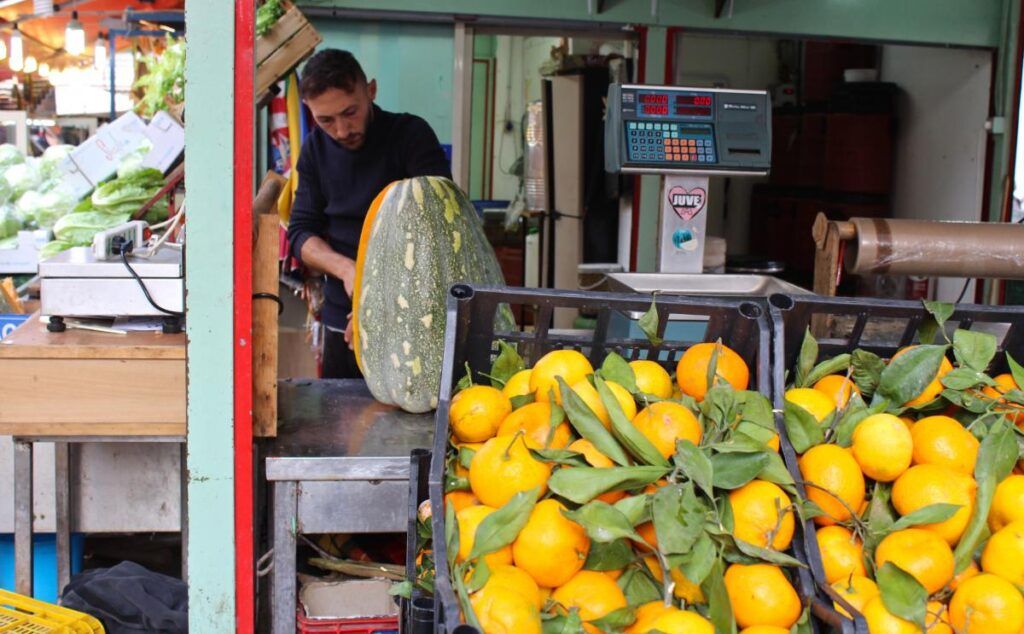
Markets are where meals begin. Whatever looks good that day becomes the main meal or pranzo, served between 1:00 – 2:00 PM. That’s when every business shuts down and Sicilians go home to eat with their families.
Set your alarm and get there early!
Wise travelers already know the first rule for Sicilian markets: Get there early. Watch the vendors set up their stalls before the shoppers arrive. Watch them as they trim the vegetables, arrange the fruit, set out the fish, and butcher the meat. They constantly chatter with their neighboring vendors in friendly voices, probably describing what their wives or mothers cooked for them the day before.
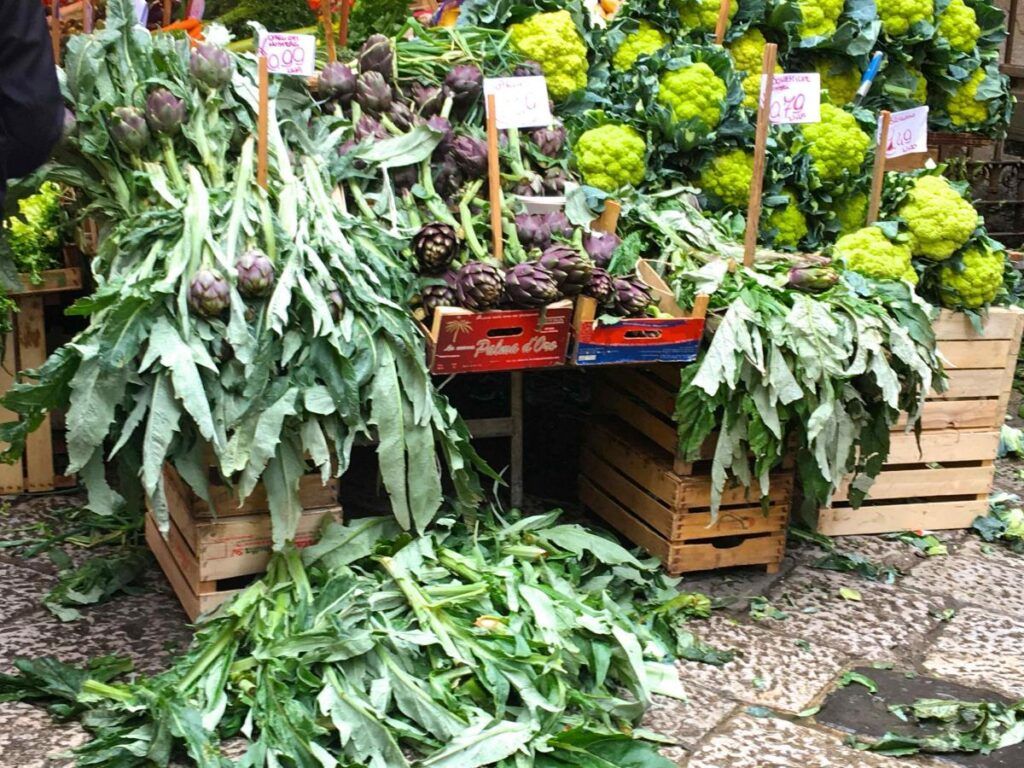
Fresh fish and meat are set out in the open air, without refrigeration and apparently without negative health consequences. The fishmongers take special care to display the day’s catch to attract customers; they pose the fish, using strings to tie heads to tails. Some add lemons or tomatoes as garnishes. Shoppers tend to develop relationships with vendors over time. In return, vendors set aside special items or top quality products for their favorite customers.
Visitors should be prepared for the noise of Sicily’s markets. Vendors shout to customers, describing what’s fresh that day, while bantering with their colleagues. Scooters zoom through the narrow aisles, dodging displays. Shoppers stop to chat with neighbors. The atmosphere is lively and loud, especially in the morning. By noon, stalls start to close. Tomorrow, it will all start again.
Four Sicilian Open-Air Markets To Experience
For an authentic experience, four markets across Sicily are worth your attention:
Mercato Ballarò, Palermo
The Arabs set up shop right here in the 10th century, naming their market “Bal’harm,” which later evolved into the name “Palermo.” Even before it opens at six in the morning, Mercato Ballarò, Palermo is busy. Set in one of Palermo’s poorer neighborhoods, the market winds its way through the narrow streets. But don’t be nervous; it’s a fascinating area, still showing the scars of World War II bombings. The contrast between the vibrant market and crumbling buildings illustrates the steadfast Sicilian determination to carry on.
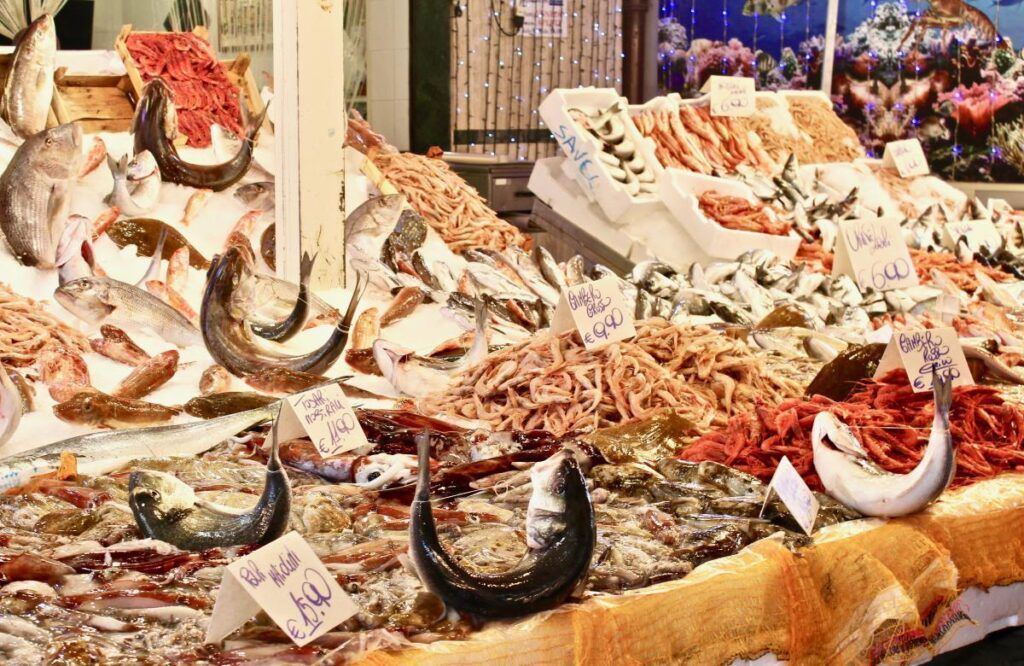
Wander the medieval streets and look at the stalls. Everything is here: food, drink, clothing, toys and housewares. People of all ages are shopping or browsing. At first, it’s jolting to see such a conglomeration of items, but then suddenly it makes perfect sense. Why wouldn’t a housewife shop for broccoli, and then pick up a bra? Squid next to socks? Efficient! The Ballarò Street Market is open near Piazza Reale every day from 6:00 AM to 2:00 PM, rain or shine.
Vucciria Market, Palermo
Enter the 700-year-old Mercato Vucciria through an ancient gate and join the crowd. Vucciria translates from the Norman (French) word “boucherie,” meaning butcher shop. The market opens at 6am, but the fishmongers welcome customers before sunrise.
Produce isn’t always pretty or perfect. Your own chain grocery store would never sell some of the produce at this market, but it was all picked merely hours before and the flavor is unparalleled. It hasn’t been engineered to look blemish-free. Every fruit or vegetable comes from carefully-tended gardens that have been cared for by families that have been farming for generations.
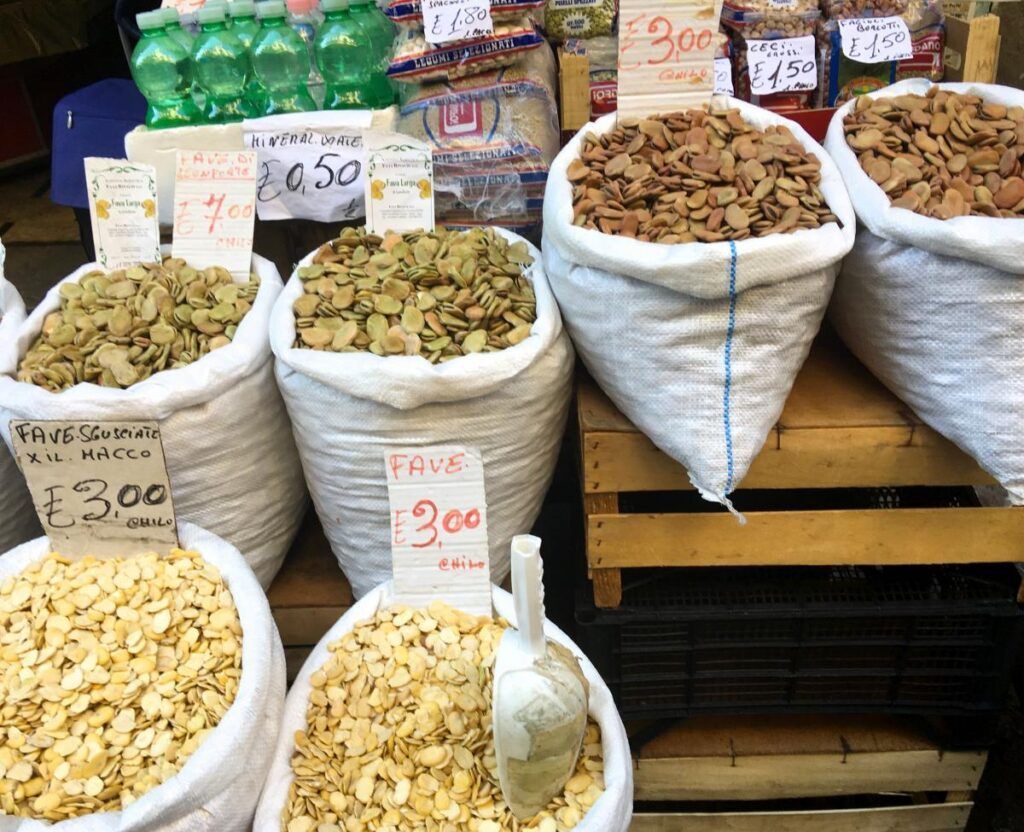
Some visitors prefer the Vucceria market because of the food options. Wandering the streets, you realize everything is here: beans, spices, olives and even fried snacks. Shops behind the stalls sell cheese, sausage and pastries. Stop at a tiny bar for a coffee (caffè) or a glass of wine. Ask the man in the deli to make you a sandwich (pannino). The Vucciria Market is open Monday through Saturday from 6:00 AM – 2:00 PM, although the fishermen arrive around 4:00 AM. It’s near the Quattro Canti and the Marorana Church.
Ortigia Market, Syracuse
Syracuse, the ancient Greek city, is home to Mercato di Ortigia filled with swordfish, eggplants, citrus, honey and wine. Seasonal produce is always abundant. Depending on when you go, look for wild asparagus and wild fennel. Blood oranges are also unique to the region. Ortigia Market is the place to find Ragusano cheese, one of the oldest types of cheese in Sicily, dating to 1500.
It is made exclusively in Syracuse and nearby Ragusa. Sicily is also the birthplace of ricotta cheese, available in a variety of forms, from fresh to hard. Cheesemongers are happy to let you sample. Use your thumb and forefinger to indicate that you want a little taste and say, “Piccolo.” The market is in the oldest section of Syracuse, on the tiny island of Ortygia, where Syracuse began almost 3,000 years ago.
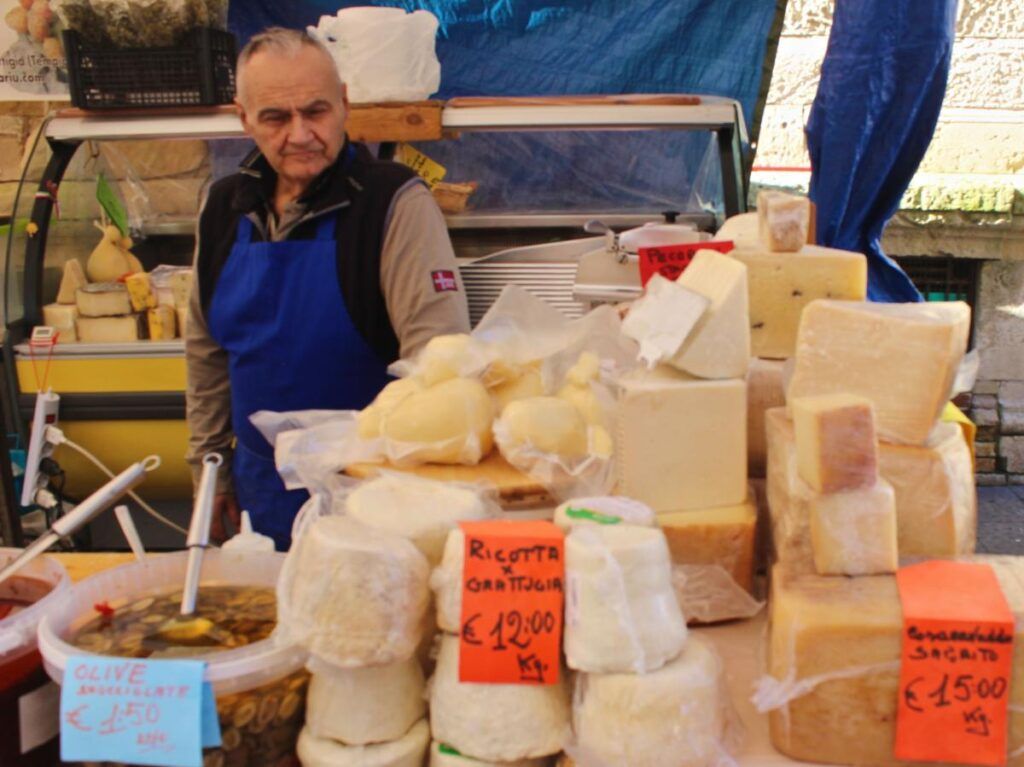
Open every day except Sunday, it feels more relaxed than the markets of Palermo, although it is just as busy. A short walk from downtown Syracuse, cross over either the Santa Lucia or Ponte Nuova bridge and look for the bright awnings. When you are hungry, head to Caseificio Borderi, located on Via Emmanuelle de Benedictis 6.
It’s a small deli and cheese shop with a daily queue of patient patrons. For five Euros, the owner, Andrea Borderi makes each person a unique sandwich. The wait goes quickly as he hands out meat and cheese samples. How great are his creations? They have been voted the #1 Street Food in Italy! The Ortygia Market is open Monday through Saturday from 6:00 AM – 2:00 PM. Caseficio Borderi is open from 7:00 AM – 4:00 PM Monday through Saturday.
Carlo Alberto Market, Catania
Famous for its pescheria (fish market), business at Mercato de Carlo Alberto begins as soon as the fishermen arrive with their catch. Whatever they catch during the night is for sale, so customers arrive early to get their first choice. If watching fishermen set up shop before dawn isn’t in your plans, don’t miss the pescheria as it closes around 1:00 PM. It is fascinating to watch the area get packed up and cleaned, while the last of the day’s customers browse and vegetable vendors stroll through, selling the last of their produce.
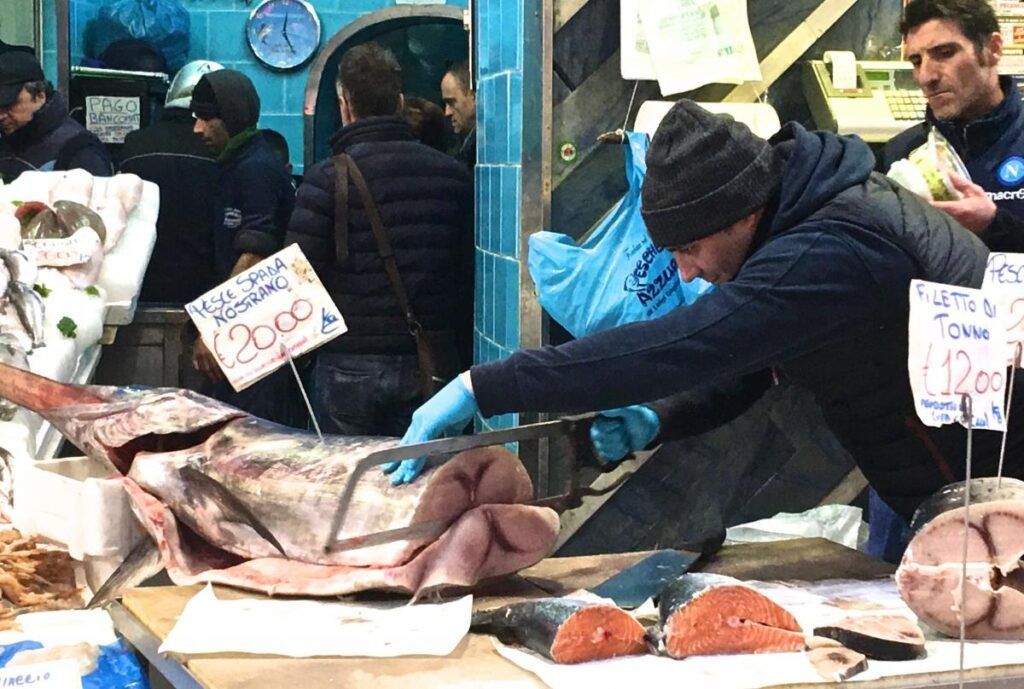
Never pass up a Sicilian market!
Although cities have the biggest markets, every town hosts at least one open-air market a week. Small markets can offer many of the same products as the larger ones. Sicily is a fertile island, growing much of the produce for Western Europe. Vendors are happy to show you what’s available and will try their best to demonstrate how to use or cook what they sell. After a visit to a Sicilian market, a trip to your own grocery store will seem boring.
Check out more articles about Italy:
- Best beaches in Elba Island
- Best budget-friendly places to stay on Amalfi Coast
- Things to do on Lake Como
- The best of Venice in 24 hours
- Venice in one day
- Things to do in Venice for New Year
- Why you should visit the Jewish ghetto in Venice
- Best pasticcerias in Venice
- Mini guide on how to get to Venice
- Things to see in Caorle

